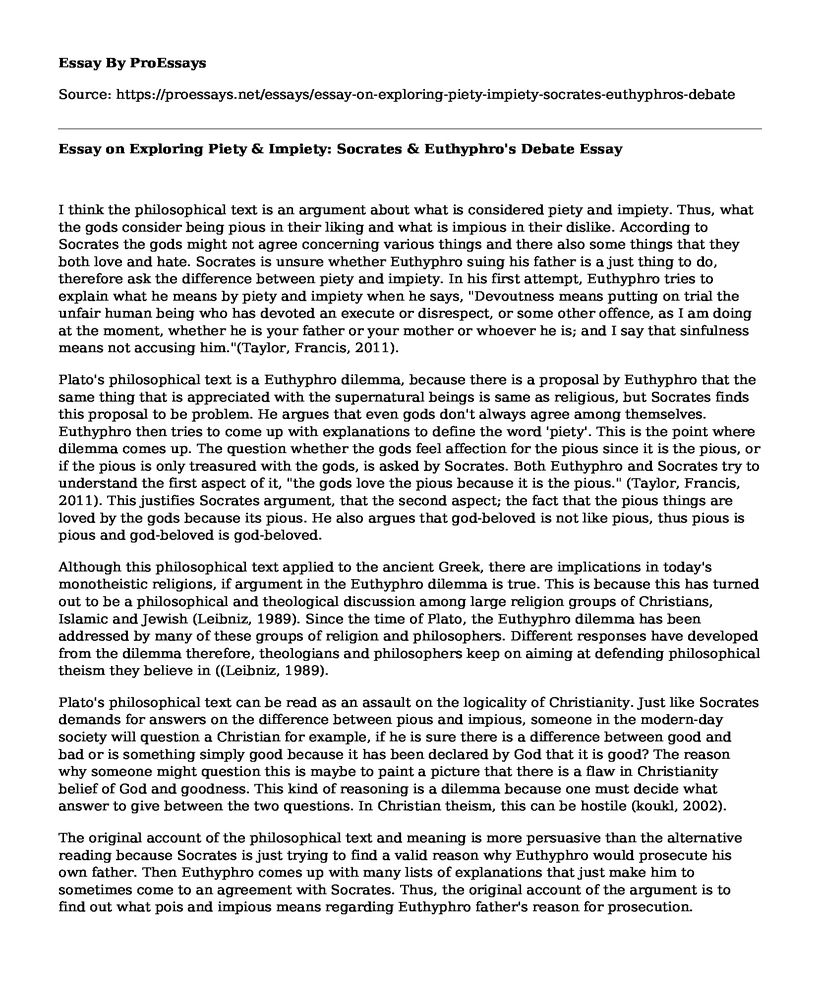I think the philosophical text is an argument about what is considered piety and impiety. Thus, what the gods consider being pious in their liking and what is impious in their dislike. According to Socrates the gods might not agree concerning various things and there also some things that they both love and hate. Socrates is unsure whether Euthyphro suing his father is a just thing to do, therefore ask the difference between piety and impiety. In his first attempt, Euthyphro tries to explain what he means by piety and impiety when he says, "Devoutness means putting on trial the unfair human being who has devoted an execute or disrespect, or some other offence, as I am doing at the moment, whether he is your father or your mother or whoever he is; and I say that sinfulness means not accusing him."(Taylor, Francis, 2011).
Plato's philosophical text is a Euthyphro dilemma, because there is a proposal by Euthyphro that the same thing that is appreciated with the supernatural beings is same as religious, but Socrates finds this proposal to be problem. He argues that even gods don't always agree among themselves. Euthyphro then tries to come up with explanations to define the word 'piety'. This is the point where dilemma comes up. The question whether the gods feel affection for the pious since it is the pious, or if the pious is only treasured with the gods, is asked by Socrates. Both Euthyphro and Socrates try to understand the first aspect of it, "the gods love the pious because it is the pious." (Taylor, Francis, 2011). This justifies Socrates argument, that the second aspect; the fact that the pious things are loved by the gods because its pious. He also argues that god-beloved is not like pious, thus pious is pious and god-beloved is god-beloved.
Although this philosophical text applied to the ancient Greek, there are implications in today's monotheistic religions, if argument in the Euthyphro dilemma is true. This is because this has turned out to be a philosophical and theological discussion among large religion groups of Christians, Islamic and Jewish (Leibniz, 1989). Since the time of Plato, the Euthyphro dilemma has been addressed by many of these groups of religion and philosophers. Different responses have developed from the dilemma therefore, theologians and philosophers keep on aiming at defending philosophical theism they believe in ((Leibniz, 1989).
Plato's philosophical text can be read as an assault on the logicality of Christianity. Just like Socrates demands for answers on the difference between pious and impious, someone in the modern-day society will question a Christian for example, if he is sure there is a difference between good and bad or is something simply good because it has been declared by God that it is good? The reason why someone might question this is maybe to paint a picture that there is a flaw in Christianity belief of God and goodness. This kind of reasoning is a dilemma because one must decide what answer to give between the two questions. In Christian theism, this can be hostile (koukl, 2002).
The original account of the philosophical text and meaning is more persuasive than the alternative reading because Socrates is just trying to find a valid reason why Euthyphro would prosecute his own father. Then Euthyphro comes up with many lists of explanations that just make him to sometimes come to an agreement with Socrates. Thus, the original account of the argument is to find out what pois and impious means regarding Euthyphro father's reason for prosecution.
On the other hand, an alternative reading makes the readers an opportunity to interpret Plato's text as a challenge that forces consideration on the nature's mortality. Besides, it as well requires a lot of questioning like who is the maker of the law. The alternative reading is also less persuasive because the Biblical view of God is mischaracterized. Furthermore, the outside meaning of piety is not necessary because mortality is knowledgeable through intuition of morals (koukl, 2002).
Socrates was right to ask Euthyphro the reason why he is prosecuting his father. His father didn't deserve the prosecution because his is not responsible for the slave's death. I think that the father should not be prosecuted because Euthyphro failed to accurately answer Socrates questions. Socrates differs with Euthyphro in his entire first, second, third and fourth attempts to answer the question. In the fifth attempt, Euthyphro at least comes to an agreement but again he is challenged. In response he becomes frustrated and leaves the dialogue. He didn't have a valid reason to prosecute his father.
Therefore, I cannot be persuaded otherwise that Socrates was wrong to ask those questions. Someone might disagree with me because there is a dilemma in the dialogue, but the truth is that Euthyphro did not understand what piety and impiety are. He feared to risk angering the gods and what men would say and only contradicted himself at the end.
References
Gregory koukl (2002). "Stand to Reason" http://www.str.org/
Leibniz, Gottfried (1989) [1702(?)]. "Reflections on the Common Concept of Justice". In Leroy Loemker (ed.). Leibniz: Philosophical Papers and Letters. Dordrecht: Kluwer.
Taylor, Francis Group (2011). From Plato to Derrida/Forest E. Baird, editor-6th ed. Rev.ed of Philosophic Classic.2008.
Cite this page
Essay on Exploring Piety & Impiety: Socrates & Euthyphro's Debate. (2023, Feb 12). Retrieved from https://proessays.net/essays/essay-on-exploring-piety-impiety-socrates-euthyphros-debate
If you are the original author of this essay and no longer wish to have it published on the ProEssays website, please click below to request its removal:
- Essay on the Utilitarian Theory
- Compare and Contrast Essay on Free Will vs. Determinism
- Definition of Meaningfulness, Happiness, and Morality Using Todd May Ideas
- The Relationship Between Emotions or Feelings to Morality
- Applying Ethical Principles in the Field of Health Care Case Study
- Ethical Concerns Affect the Role of Business in Society Essay Example
- Compatibilism: Resolving the Dilemma of Determinism & Free Will - Essay Sample







